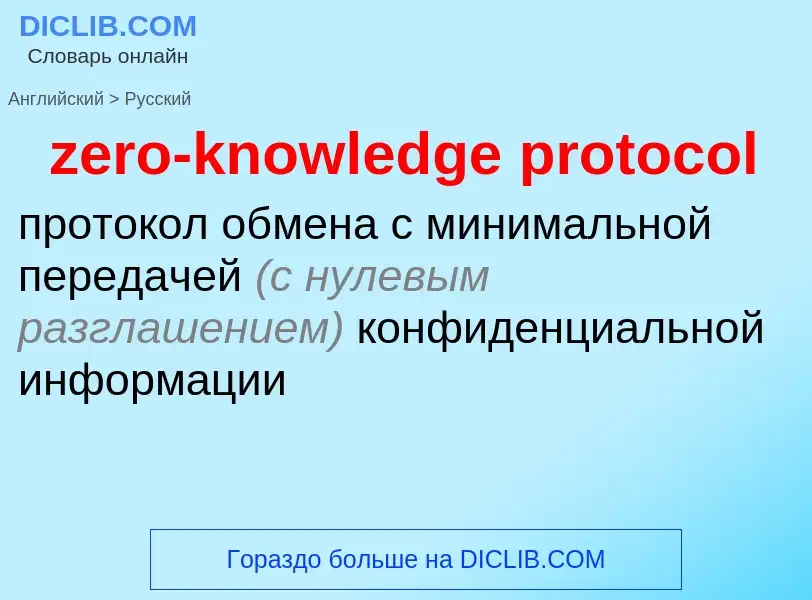Traduction et analyse de mots par intelligence artificielle ChatGPT
Sur cette page, vous pouvez obtenir une analyse détaillée d'un mot ou d'une phrase, réalisée à l'aide de la meilleure technologie d'intelligence artificielle à ce jour:
- comment le mot est utilisé
- fréquence d'utilisation
- il est utilisé plus souvent dans le discours oral ou écrit
- options de traduction de mots
- exemples d'utilisation (plusieurs phrases avec traduction)
- étymologie
zero-knowledge protocol - traduction vers russe
медицина
клинический протокол
Définition
Wikipédia
In cryptography, a zero-knowledge proof or zero-knowledge protocol is a method by which one party (the prover) can prove to another party (the verifier) that a given statement is true while the prover avoids conveying any additional information apart from the fact that the statement is indeed true. The essence of zero-knowledge proofs is that it is trivial to prove that one possesses knowledge of certain information by simply revealing it; the challenge is to prove such possession without revealing the information itself or any additional information.
If proving a statement requires that the prover possess some secret information, then the verifier will not be able to prove the statement to anyone else without possessing the secret information. The statement being proved must include the assertion that the prover has such knowledge, but without including or transmitting the knowledge itself in the assertion. Otherwise, the statement would not be proved in zero-knowledge because it provides the verifier with additional information about the statement by the end of the protocol. A zero-knowledge proof of knowledge is a special case when the statement consists only of the fact that the prover possesses the secret information.
Interactive zero-knowledge proofs require interaction between the individual (or computer system) proving their knowledge and the individual validating the proof. Non-interactive zero-knowledge proofs can be constructed from any interactive scheme by relying on the Fiat-Shamir heuristic, which is the most common instantiation of such proofs today. However, the validity of the proof relies on computational assumptions (typically the assumptions of an ideal cryptographic hash function).
A protocol implementing zero-knowledge proofs of knowledge is often presented as a transcript where a prover responds to interactive inputs from the verifier. This interactive input is usually in the form of one or more challenges such that the responses from the prover will convince the verifier if and only if the statement is true, i.e., if the prover does possess the claimed knowledge. If this were not the case, the verifier could record the execution of the protocol and replay it to convince someone else that they possess the secret information. The new party's acceptance is either justified since the replayer does possess the information (which implies that the protocol leaked information, and thus, is not proved in zero-knowledge), or the acceptance is spurious, i.e., was accepted from someone who does not actually possess the information.

